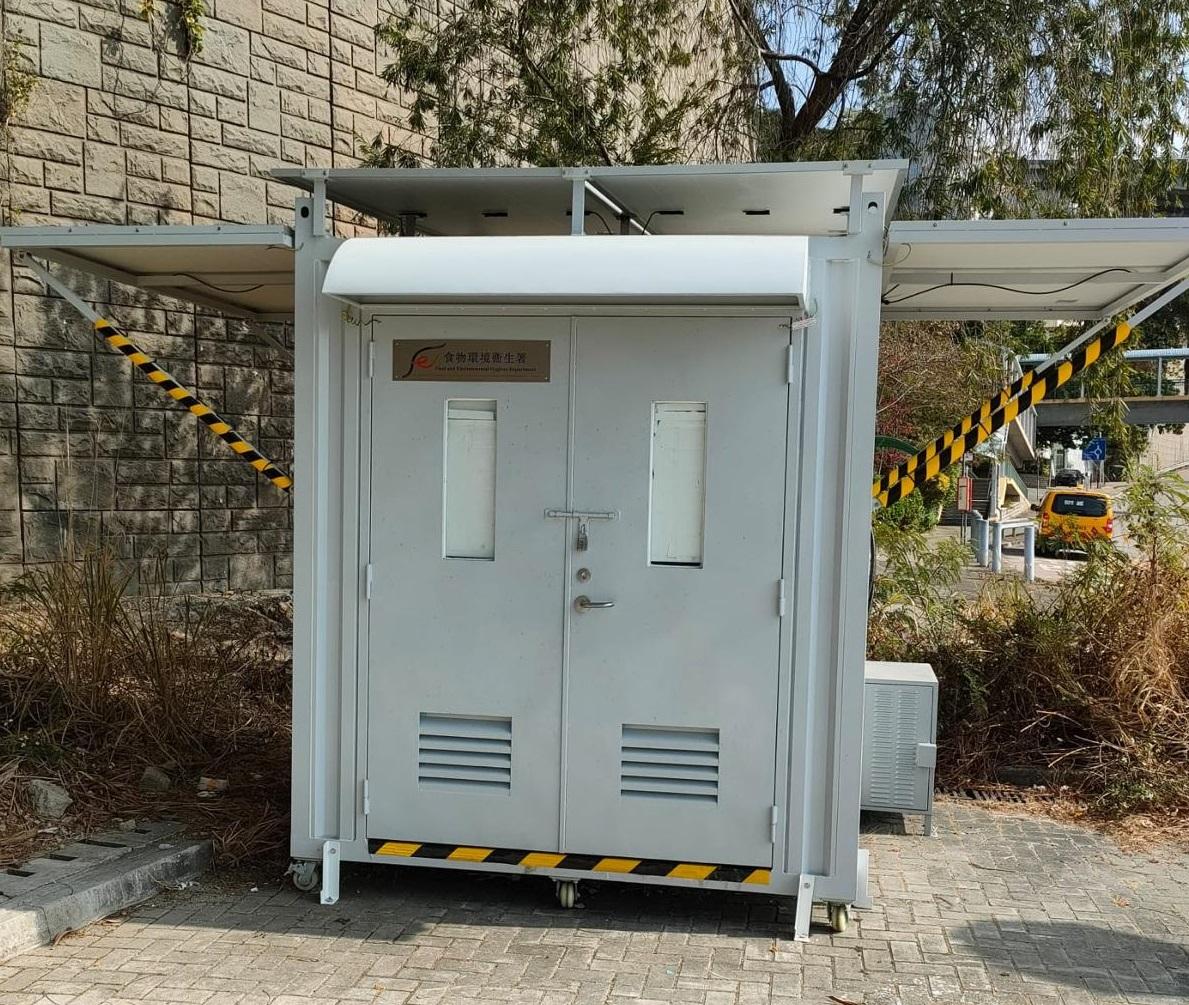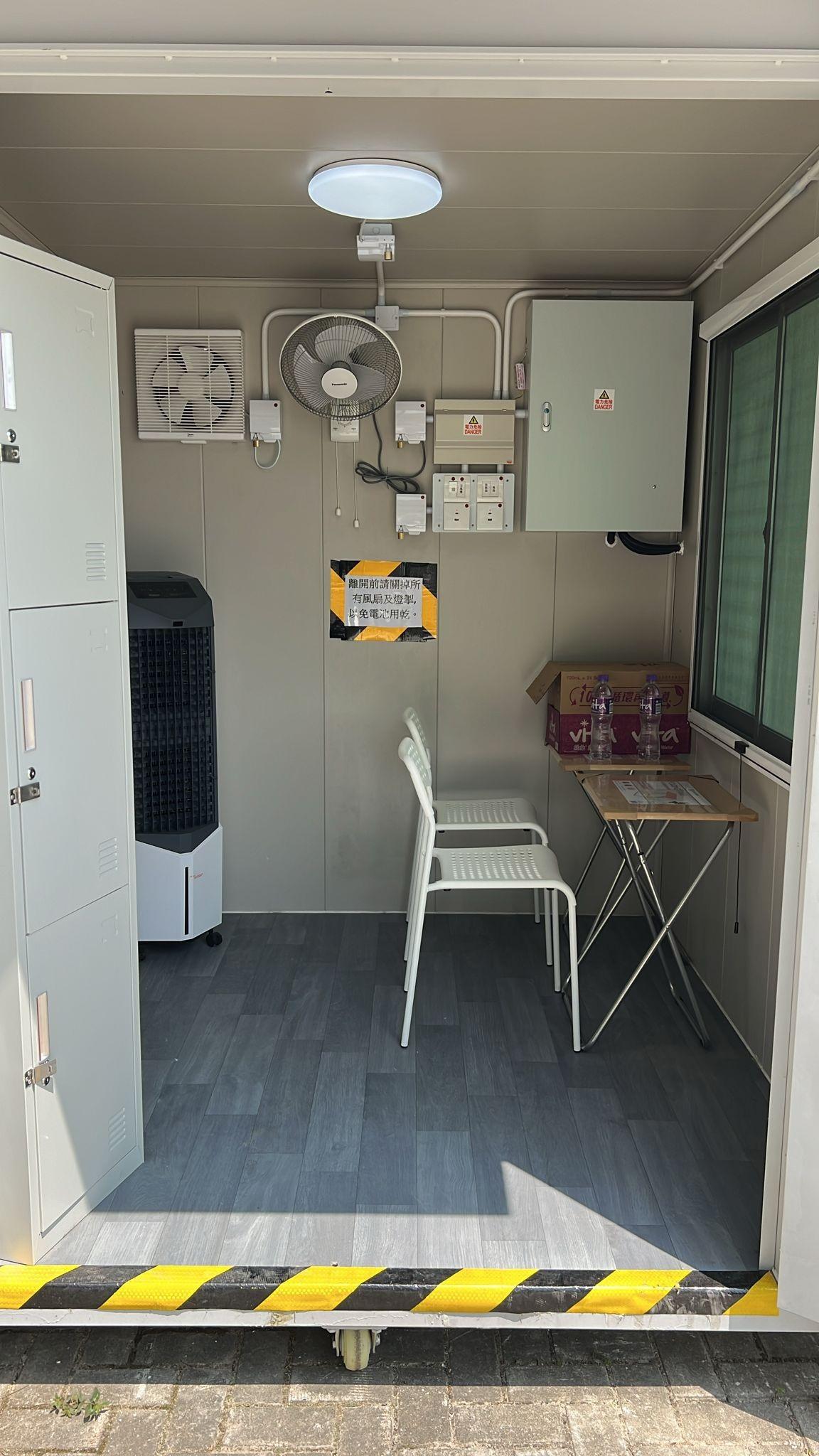A spokesman for the Food and Environmental Hygiene Department (FEHD) said today (April 30) that the department has installed more solar cooling kiosks, equipped with solar-powered facilities, at resting facilities in rural areas this year for the convenience of cleansing workers. The spokesman said that it is an improvement measure following the comprehensive review of the working environment of frontline cleansing workers in urban and rural areas last year to take care of the needs of its workers. Other measures implemented last year include provisions for drinking water, places for short breaks, water for cleansing tools, and toilet facilities.
The spokesman said, “There are some 900 village-type refuse collection points (RCPs)/RCPs with temporary structures under the FEHD, and most of them are located in rural areas and are unable to provide these convenience facilities within the RCPs due to geographical constraints. Despite the fact that no personnel were deployed to be stationed at the RCPs, the department continues to review arrangements and ensure that cleansing workers at work nearby can access drinking water, places for short breaks during hot weather, water for cleansing tools, and toilet facilities in their work zones or within a few minutes’ walk. In addition to the provision of 35 rest facilities in rural areas, the FEHD has installed 60 solar cooling kiosks to further improve the resting environment for rural workers. These kiosks are equipped with solar-powered facilities including air coolers, electric fans and exhaust fans. Furthermore, similar solar-powered facilities have been added to 15 resting facilities in rural areas for cleansing workers. The FEHD will continue to identify more suitable locations to provide resting facilities for workers.”
In fact, the FEHD has always been concerned about the working environment and welfare of frontline workers, and makes appropriate arrangements based on the operational needs of RCPs. Since 2020, in collaboration with the Architectural Services Department, the FEHD has proactively refurbished RCPs. Out of the 49 covered by the scheme, the facelifting or refurbishment works of 17 permanent off-street RCPs have been completed, with works for three more either commenced or set to begin this year. Detailed designs are underway for 22 RCPs, and the remaining seven RCPs are under initial planning. In newly built or refurbished RCPs, the FEHD will provide staff with changing and personal storage spaces, facilities for short breaks and meals, as well as amenities such as cold and hot water dispensers, microwave ovens, electric steamers, refrigerators, electric fans, tables and chairs and power sockets to facilitate staff use. Air conditioning systems will also be installed in the staff dining rooms where feasible. During the improvement works, the FEHD will arrange relevant cleansing workers to use nearby welfare facilities or be redeployed to other RCPs.
Currently, all street cleansing service contract workers and cleansing workers of the department are provided with new uniforms featuring sweat-wicking, breathable, and reflective properties. Portable waist fans have been distributed to all outdoor cleansing workers of the department, aiding in cooling during hot weather. Since 2022, the FEHD has added a new contract clause when tendering service contracts, requiring contractors to provide portable waist fans to outdoor working staff.
Following the Labour Department’s issuance of Guidance Notes on Prevention of Heat Stroke at Work last year, the FEHD conducted assessments for departmental staff in accordance with the criteria provided in the Guidance Notes and requested contractors to do the same. Each assessed staff member has received written notification of the results, which have also been put up at roll-call points in various districts so that staff can be aware of the results. When the Heat Stress at Work Warning is in effect, the FEHD and its contractors must arrange rest breaks for employees based on the adjusted hourly rest time listed on the assessment forms.
Moreover, since April 1, 2019, the Government has implemented a series of measures to better safeguard the remuneration of outsourced non-skilled workers. After a further review in May 2023, the Government introduced enhancement measures relating to the employment of non-skilled workers under government service contracts. Regarding the FEHD’s cleansing service contracts, after the inclusion of relevant measures in tender documents, the proposed committed monthly wage of non-skilled workers offered by tenderers have significantly increased. As at March this year, the current average committed monthly wage of a cleansing worker is 45 per cent higher than the monthly wage of $9,920 calculated based on the latest statutory minimum wage.
These enhancement measures have also strengthened the protection of occupational safety and health of non-skilled workers. Tenderers must submit a certified heat stroke prevention work plan, failing which the tender will not be considered. To ensure effective implementation of the work plan, the Government has expanded the demerit point system to cover non-compliances with the heat stroke prevention work plan for the protection of non-skilled workers. FEHD staff will conduct inspections to ensure that contractors have complied with the work plan. If a contractor fails to implement the measures committed in the work plan, the FEHD could issue a notice of blatant default to the contractor, deduct its monthly service payments and record demerit points under the demerit point system. Contractors accruing three demerit points over a rolling period of 36 months will be debarred from bidding for government non-skilled worker contracts for five years.





